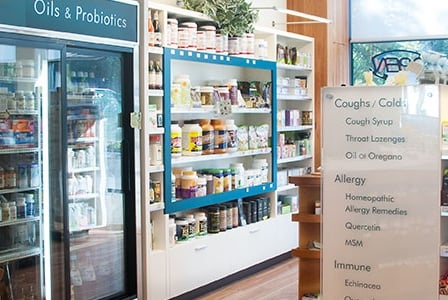
Want to make use of your natural health food store this year? Learn how to navigate its aisles, and discover its best kept secrets.
January symbolizes a fresh start, excitement, hope, and plans for a healthy year ahead. Many of us flock to our local health food stores to stock up on whole foods, unprocessed snacks, and all sorts of supplements. But the truth is that it can be a daunting place for those just starting out, filled with long aisles of unfamiliar products.
A healthy start
Have no fear: we’re here to help you navigate your health food store! And for those who are already avid healthy shoppers, there are likely some undiscovered gems within your local store. Consider this a refresher course: below, we break down stores section by section, explaining why they’re worth checking out and how to shop like a pro.
Fresh produce
Why it’s worth a visit
Fresh produce is the bread and butter of a healthy diet (no pun intended). However, conventionally grown produce often contains pesticide residue, even when washed. According to the US-based Environmental Working Group (EWG), a single grape could contain 15 types of pesticides.
Although buying organic isn’t a guarantee for avoiding pesticides (as contamination can occur), pesticides are not allowed to be added to organic produce, so it’s a great way to minimize exposure.
Insider tips and tricks
The produce section is one of the very few places in a store where you can try almost anything and it will still be a healthy choice—no label reading required. Health food stores may have a unique selection not normally seen in a grocery store. Rather than shy away from trying that strange-looking vegetable, ask the produce manager how to prepare and cook it—you might end up with some new favourite foods!
Dairy and meat
Why it’s worth a visit
This section typically includes free-range and organic eggs, and organic meat, milk, cheese, and yogurt—but can contain many dairy products such as kefir, sour cream, and butter.
When a dairy or meat product is certified organic, it means strict guidelines must be followed to ensure the animals’ health and well-being and reduce their stress. For instance:
- The animals are only allowed to consume organic feed.
- Drugs are not permitted for use on healthy animals.
- Growth hormones are not allowed to be used
on animals. - Animals must have appropriate living conditions, including access to the outdoors and space for exercise, natural daylight, access to fresh water, and high quality feed.
Insider tips and tricks
If your local health food store is small, meat or dairy deliveries may only occur once or twice a week. Ask the staff when deliveries happen so you can get best selection.
Dry goods
Why it’s worth a visit
In the centre aisles, you’ll find everything from canned beans to nondairy milk alternatives. While these products may look a lot like regular products found at grocery stores, don’t be fooled—many are gluten-free or organic alternatives to their conventional counterparts.
Organic processed foods are also required to be made without the use of genetically modified organisms (GMOs); artificial preservatives, sweeteners, and colours; or synthetic preservatives and fertilizers.
Insider tips and tricks
Love something a lot? Ask about case lot sales, or the ability to buy an entire case. You may even qualify for a discount.
When shopping for cans, avoid those with a lining that contains bisphenol A (BPA)—the notorious hormone disruptor that’s also found in some plastics. Cans that don’t contain BPA will say so on the label.
Bulk goods
Why it’s worth a visit
The bulk section is an amazing way to stock up on healthy snacks, teas, herbs, grains, nuts, seeds, and much more, in an eco-friendly way that uses less packaging. Bulk is also often a slightly cheaper alternative.
Insider tips and tricks
BYOB! Bring your own bag, that is. While many shoppers bring their own shopping bags, many forget that we can bring our own lightweight reusable mesh or cloth bags for other produce or bulk goods. Don’t have any? Well-stocked health food stores have them available for purchase.
Supplements
Why it’s worth a visit
The pride and joy of many health food stores is their supplement section. Not only do they carry specialty products and brands not always found at big-box stores, but the staff is also very knowledgeable about these products. Some stores even have connections with local naturopaths or herbalists who can offer additional information.
Many supplements found at natural health retailers boast the same certifications and standards as the food they stock: many are natural, organic, vegan, and even non-GMO.
Insider tips and tricks
Rows and rows of bottles with fine print can be overwhelming to navigate, so when it comes to supplements, more information is always better. First, always ask your health care practitioner before taking a new supplement.
It’s also helpful to seek out the store’s in-house supplement manager to get advice and info about
- product literature and samples
- the differences between brands
- proper storage and dosage
Beauty
Why it’s worth a visit
Food isn’t alone in its chemical content: conventional cosmetics can be packed with potentially hazardous compounds. The David Suzuki Foundation’s “Dirty Dozen” list of the most hazardous common chemicals in beauty and skin care products includes
- BHA and BHT
- coal tar dyes
- DEA-related ingredients
- dibutyl phthalate
- formaldehyde-releasing preservatives
- parabens
- parfum/fragrance
- PEG compounds
- petrolatum
- siloxanes
- sodium laureth sulphate
- triclosan
Choosing products from natural health retailers, coupled with careful label and ingredient list reading, can help you avoid these suspicious substances. Also check out the EWG’s Skin Deep Cosmetics Database to rate your brands at ewg.org/skindeep.
Insider tips and tricks
Not sure if the product will work for you? Ask for a sample or trial size that will last a few days. That way, you’ll be able to determine if the product is right for you. You may also wish to ask
- about the company’s return policy
- what skin type it’s formulated for
- if they’ve received previous customer feedback about it
Cleaning products
Why it’s worth a visit
Just like food and cosmetics, conventional cleaning products can contain chemicals that can be hazardous for the environment; trigger allergies or asthma; or have been linked to reproductive disorders, hormonal disorders, or cancer.
Insider tips and tricks
You may be able to buy cleaning products in bulk too, using containers you bring in yourself. Check with store staff to see what’s available in bulk.
Check out the EWG’s Guide to Healthy Cleaning to rate your brands at ewg.org/guides/cleaners.
Extra credit
Want to go the extra mile for special deals and service? Make note of these tips.
Coupons
Make no mistake—coupons exist for natural and organic products too! Check out your favourite companies’ websites to sign up for deals, or ask store staff about coupons and special prices.
Newsletters
Many stores send out mail or email newsletters that let shoppers know of events, deals, and savings. Ask when you’re next in the store.
Lectures
Natural health personalities, authors, and naturopathic doctors sometimes stop by to give educational lectures. Some events may be held during store hours, while others may be held during evenings, and participants must sign up in advance.
Sample days
Many companies sample some favourite products or new brands. Stores likely know in advance when this happens, so it’s worth asking about.
Special orders
Need a bigger size? Want to buy in bulk? Can’t find a specific product? Again, sometimes all you need to do is ask, and helpful store staff may be able to place a special order for you.















